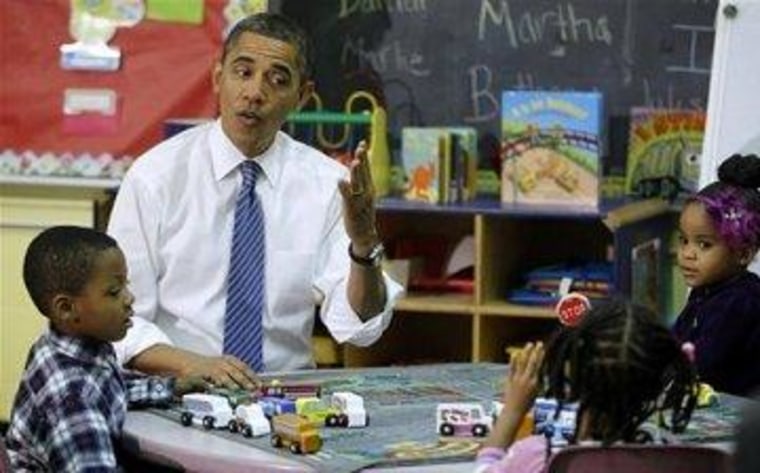Reflecting on a Head Start center in Indiana getting slammed by sequestration cuts, Jared Bernstein said something yesterday that caught my eye.
Bernstein, an economist at the Center on Budget and Policy Priorities and a former member of Vice President Biden's team, noted that two Indiana Head Start programs have been forced to adopt "random drawings" to see which children can stay and which will have to go without in the wake of the sequester policy that the much of political world seems to have forgotten about.
Got that? A lottery to see who gets kicked out of preschool? That's how we're building the future? Really? That's a better way forward than closing the carried interest loophole or lowering the housing subsidy to the most affluent homebuyers?"Columbus resident Alice Miller told WTHR-TV that her 4-year-old son, Sage, was one of the children cut from the program. She spoke about how the program has helped her son advance academically and socially... 'He loves school,' Miller said. 'I don't know how I'm going to tell him he's not going back.'"If that doesn't break your heart, you might want to get to the emergency room to see if it's still there.
Quite right. Nothing says "21st century global superpower" like forcing eager pre-school children out of Head Start centers because of pointless spending cuts.
The sequester continues to do real harm to real people, just outside the headlines of national news, and the consequences can be heartbreaking. Just ask Jeff Maryak.
But it's these Head Start centers and their sudden need for a lottery system that reminds me of a story.
President Obama, several months into his first year in office, traveled to East Asia for a series of meetings and events, and when he returned, he shared an anecdote about a luncheon he attended with the then-president of South Korea that continues to resonate.
"I was interested in education policy -- they've grown enormously over the last 40 years. And I asked him, what are the biggest challenges in your education policy? He said, 'The biggest challenge that I have is that my parents are too demanding.' He said, 'Even if somebody is dirt poor, they are insisting that their kids are getting the best education.' He said, 'I've had to import thousands of foreign teachers because they're all insisting that Korean children have to learn English in elementary school.' That was the biggest education challenge that he had, was an insistence, a demand from parents for excellence in the schools."And the same thing was true when I went to China. I was talking to the mayor of Shanghai, and I asked him about how he was doing recruiting teachers, given that they've got 25 million people in this one city. He said, 'We don't have problems recruiting teachers because teaching is so revered and the pay scales for teachers are actually comparable to doctors and other professions.'"That gives you a sense of what's happening around the world. There is a hunger for knowledge, an insistence on excellence, a reverence for science and math and technology and learning. That used to be what we were about."
Yes, exactly. Used to be.
Too many American policymakers have gone from insisting on excellence to insisting on slashing public investments. The goal isn't to keep the United States on top as a global superpower; the goal is to shrink government, cut taxes, and hope for the best. We're the wealthiest country on the planet by an order of magnitude, so maybe we can just coast for a while, neglecting key priorities.
The point is, I'd prefer if the United States acted like a superpower again and prepared to lead in the 21st century. For all the chest-thumping about American exceptionalism, we're not on top as the result of birthright or divine intervention -- if we want to stay on top, we're going to have to work for it.
There's a global competition underway, and we may be in the lead. But to think our advantage is insurmountable is a mistake.
Put it this way: some countries are insisting on excellence in education, our country shrugs its shoulders while kids get thrown out of pre-schools because of budget cuts. Which side of the ocean is preparing for the future?
